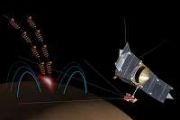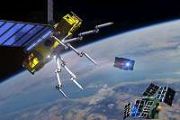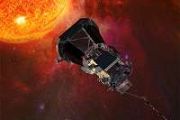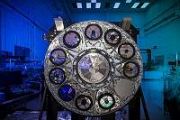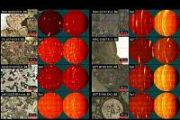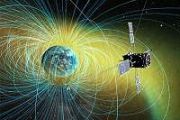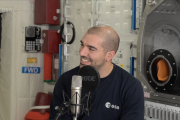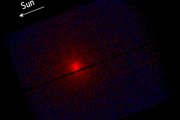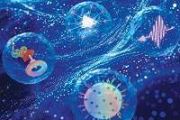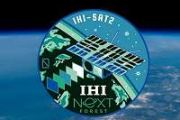
Copernical Team
NASA confirms thousands of massive, ancient volcanic eruptions on Mars
 Scientists found evidence that a region of northern Mars called Arabia Terra experienced thousands of "super eruptions," the biggest volcanic eruptions known, over a 500-million-year period.
Some volcanoes can produce eruptions so powerful they release oceans of dust and toxic gases into the air, blocking out sunlight and changing a planet's climate for decades. By studying the topography
Scientists found evidence that a region of northern Mars called Arabia Terra experienced thousands of "super eruptions," the biggest volcanic eruptions known, over a 500-million-year period.
Some volcanoes can produce eruptions so powerful they release oceans of dust and toxic gases into the air, blocking out sunlight and changing a planet's climate for decades. By studying the topography Justin Simon Shepherds Perseverance through first phase of Martian rock sampling
 The Johnson Space Center scientist was tasked with helping guide the way for mission's first cored Mars rock sample.
The evening of Aug. 1 felt a lot like a birthday to NASA planetary scientist Justin Simon. On that night, Simon attended a virtual watch party for researchers preparing to use NASA's Mars 2020 Perseverance rover to conduct the first detailed study of a candidate rock target
The Johnson Space Center scientist was tasked with helping guide the way for mission's first cored Mars rock sample.
The evening of Aug. 1 felt a lot like a birthday to NASA planetary scientist Justin Simon. On that night, Simon attended a virtual watch party for researchers preparing to use NASA's Mars 2020 Perseverance rover to conduct the first detailed study of a candidate rock target Dynetics selected to build NASA's sustainable lunar lander
 Dynetics, a wholly owned subsidiary of Leidos, has been selected to help NASA enable a steady pace of crewed trips to the Moon's surface as part of the Artemis program's Next Space Technologies for Exploration Partnerships (NextSTEP-2) Appendix N.
As one of five companies selected for a firm fixed-price, milestone-based contract, Dynetics will receive an initial award of $40.8 million over
Dynetics, a wholly owned subsidiary of Leidos, has been selected to help NASA enable a steady pace of crewed trips to the Moon's surface as part of the Artemis program's Next Space Technologies for Exploration Partnerships (NextSTEP-2) Appendix N.
As one of five companies selected for a firm fixed-price, milestone-based contract, Dynetics will receive an initial award of $40.8 million over Take a 3D Spin on Mars and track NASA's Perseverance Rover
 Two interactive web experiences let you explore the Martian surface, as seen by cameras aboard the rover and orbiters flying overhead.
It's the next best thing to being on Mars: Two online interactive experiences let you check out Jezero Crater - the landing site and exploration locale for NASA's Perseverance rover - without leaving our planet.
One new experience, called "Explore wit
Two interactive web experiences let you explore the Martian surface, as seen by cameras aboard the rover and orbiters flying overhead.
It's the next best thing to being on Mars: Two online interactive experiences let you check out Jezero Crater - the landing site and exploration locale for NASA's Perseverance rover - without leaving our planet.
One new experience, called "Explore wit Flying On Mars is getting harder and harder
 In the months since we flew for the first time, we have learned a great deal about operating a helicopter on Mars. We have explored Ingenuity's strengths and limitations in detail, leveraging the former and working around the latter to operationalize it as a highly capable reconnaissance platform.
With the benefit of the knowledge acquired, conducting flights on Mars has in most ways becom
In the months since we flew for the first time, we have learned a great deal about operating a helicopter on Mars. We have explored Ingenuity's strengths and limitations in detail, leveraging the former and working around the latter to operationalize it as a highly capable reconnaissance platform.
With the benefit of the knowledge acquired, conducting flights on Mars has in most ways becom UK space company to establish link with the far side of the Moon
 The satellite, named Lunar Pathfinder, will be vital for the planned return missions to the Moon. Built by Surrey Satellite Technology Ltd (SSTL) and supported by 11.6 million pounds in UK Space Agency funding via the European Space Agency (ESA), the satellite will also allow greater freedom for rovers operating on the far side of the Moon, allowing them to manoeuvre out of sight of their lander
The satellite, named Lunar Pathfinder, will be vital for the planned return missions to the Moon. Built by Surrey Satellite Technology Ltd (SSTL) and supported by 11.6 million pounds in UK Space Agency funding via the European Space Agency (ESA), the satellite will also allow greater freedom for rovers operating on the far side of the Moon, allowing them to manoeuvre out of sight of their lander Combined tests start for Ariane 6 at Europe's Spaceport
 Europe's Spaceport in French Guiana is performing the first combined test in preparation for the inaugural flight of Ariane 6, Europe's new generation launch vehicle.
This test confirms the operations and electrical and mechanical equipment required for integration of the upper part of the launch vehicle. The procedures are carried out in conditions representative of a launch campaign. A m
Europe's Spaceport in French Guiana is performing the first combined test in preparation for the inaugural flight of Ariane 6, Europe's new generation launch vehicle.
This test confirms the operations and electrical and mechanical equipment required for integration of the upper part of the launch vehicle. The procedures are carried out in conditions representative of a launch campaign. A m Simultaneous presence in space surges to historic maximum of 14 people
 A new record for the maximum number of people present in low Earth orbit at the same time was set on 16 September, as 14 individuals were there.
This breaks the previous record set in March 1995, when 13 astronauts were in space.
Currently, there are seven people on the International Space Station (ISS): Russian cosmonauts Oleg Novitsky and Pyotr Dubrov, US astronauts Mark Wande Hai,
A new record for the maximum number of people present in low Earth orbit at the same time was set on 16 September, as 14 individuals were there.
This breaks the previous record set in March 1995, when 13 astronauts were in space.
Currently, there are seven people on the International Space Station (ISS): Russian cosmonauts Oleg Novitsky and Pyotr Dubrov, US astronauts Mark Wande Hai, Russian Gov't allocates $60Mln to build Soyuz for tourist flights
 The Russian government has allocated more than 4.4 billion rubles ($60.6 million) to space company Glavkosmos, a subsidiary of the Roscosmos state corporation, for the production of a rocket and spaceship for tourist flights by 2024.
"To allocate in 2021 budget funds ... of 4,412,660 thousand rubles for the expenses of State Space Corporation Roscosmos", the government said in a decree, wh
The Russian government has allocated more than 4.4 billion rubles ($60.6 million) to space company Glavkosmos, a subsidiary of the Roscosmos state corporation, for the production of a rocket and spaceship for tourist flights by 2024.
"To allocate in 2021 budget funds ... of 4,412,660 thousand rubles for the expenses of State Space Corporation Roscosmos", the government said in a decree, wh Inspiration4 civilian mission plans splashdown Saturday evening
 The crew of the first all-civilian orbital space mission, Inspiration4, plans to splash down off the coast of Florida on Saturday evening.
SpaceX plans a 7:06 p.m. EDT return to Earth, but hasn't announced the exact location. That will depend on weather and wave heights in the Gulf of Mexico and Atlantic Ocean.
"We're seeing the world every 90 minutes. That's how fast we're trave
The crew of the first all-civilian orbital space mission, Inspiration4, plans to splash down off the coast of Florida on Saturday evening.
SpaceX plans a 7:06 p.m. EDT return to Earth, but hasn't announced the exact location. That will depend on weather and wave heights in the Gulf of Mexico and Atlantic Ocean.
"We're seeing the world every 90 minutes. That's how fast we're trave 


